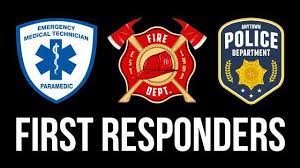“It is estimated that 30 percent of first responders develop behavioral health conditions including, but not limited to, depression and posttraumatic stress disorder (PTSD), as compared with 20 percent in the general population (Abbot et al., 2015).”
I enjoy talking with readers and hearing about your experiences more than you could imagine. I never thought that our little book would find its way into the hands of so many law enforcement professionals and first responders, but, after hearing their stories, I get it. The amount of psychological distress and overall job stress is astounding. On top of the lack of sleep and physical demands of the job, law enforcement and first responders are repeatedly exposed to trauma.
Here are some resources that specifically address the needs of law enforcement and first responders. If you know of other organizations, let us know so that we can pass it on:
Code Green Campaign (http://codegreencampaign.org/)
The Code Green Campaign is a first responder oriented mental health advocacy and education organization. Also known as Code Green, we serve all types of first responders, including firefighters, EMTs, paramedics, dispatchers, police, corrections, air medical, and search & rescue.
First Responder Support Network (https://www.frsn.org/)
The mission of the First Responder Support Network (FRSN) is to provide educational treatment programs to promote recovery from stress and critical incidents experienced by first responders and their families. FRSN provides basic and advanced peer support trainings and is available to present on topics such as critical incident stress, peer team development, and inoculation training. FRSN is available to speak with responders, their families, and anyone seeking to assist a responder or their significant other. There is no charge for the outreach and the call is confidential (unless someone is in danger).
UTHealth Trauma and Resilience Center’s First Responder Mental Health Treatment Program (https://tinyurl.com/446zajhu)
The program provides one hour of counseling a week for 8 to 15 weeks via telemedicine appointments. Specialists provide services for a range of mental health issues, including post-traumatic stress disorder, general anxiety, depression, marital problems, and sleep problems.
Heroes Helpline (https://heroeshelpline.org/)
The Heroes Helpline provides a FREE, entirely confidential, telephone support and referral service that affords first responders and healthcare workers the opportunity to seek treatment without fear of judgment, stigma, or occupational threats. Heroes Helpline allows first responders to find help for substance use disorder through a 24/7 hotline.
Healing Our Own (https://healingourown.org/getting-help)
Firefighters standing together for healthy bodies and minds. This provides a comprehensive list of resources for firefighters that have been recommended by a member of the California fire service as a resource for their peers. Resources include: Crisis lines, National programs and Regional programs.
Your turn: what organizations have helped you in your journey?
*****
“If you believe change is possible, you want to change, and you are willing to do the work, you absolutely CAN get your life back.”
Get your copy of The Soldier's Guide to PTSD, The Soldier's Workbook,



No comments:
Post a Comment